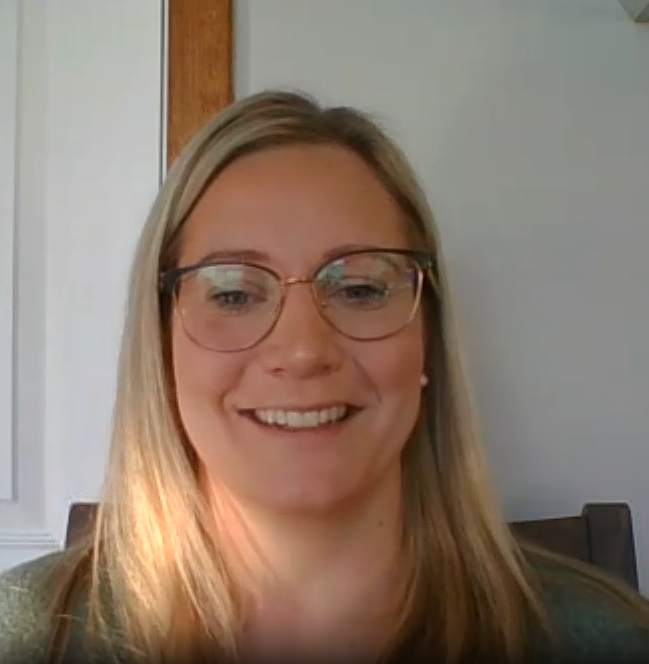Michelle2

Age at interview: 31
Michelle is 31 years old, married and has three children ages 7 years, 4 years, and 18 months old (at the time of interview). She didn’t have any previous mental health issues. She described her first pregnancy as ‘great’; she kept up with her new life with a new baby until when her daughter was about three months old. She then began having trouble sleeping, and that’s when her mental health started declining. She looked for healthcare but kept hitting roadblocks. She didn’t want anyone to know she was not feeling well because she felt ashamed.
She then started having intrusive thoughts but dismissed them as nothing although continued to get progressively worse until it became a form of psychosis. She would exhaust herself physically, such as skiing for hours, and still couldn’t sleep at night. Her memory wasn’t working correctly. She tried to look for help in many places to fix these things, but her situation got worse and then her physical health started deteriorating.
Few people in her life knew what was going on and she found it hard to navigate the system to find help. She didn’t go to the hospital nearby because she worked there and didn’t want her coworkers to know.
Michelle’s sister, who was abroad, came back and took her to a different hospital a couple of hours away, and had to be forceful to ensure Michelle received care. At the hospital, she was confused and couldn’t tell them what was happening. Although she had been on anti-anxiety medication, they gave her anti-psychotic medication, and she finally slept. She always had the support of her sister or husband.
She was admitted to the hospital and felt much better after the medications took effect. With her sister’s help again, she enrolled in a psychosis program where she could see a psychiatrist and a nurse and have access to a psychologist. She also found a great psychologist who helped her understand what was going on while adjusting her medications as needed. She understood how important going back to work was for her mental health. Because she never had mental health problems growing up, it was all new to her. She learned to manage her mental health and was finally well enough to stop the medications.
Michelle got pregnant for a second time and unfortunately had a stillbirth. It was challenging finding care in that situation. Then, she got pregnant for the third time and was proactive with everything related to her mental health, such as taking online courses. The pregnancy went well. Two and a half years later, she had another baby. All was going smoothly, her mental health was good, and she was still talking to her therapist. But then she started to get anxious again and to help her sleep she started being more physically active. However, it got to a point where she crashed and became depressed. The COVID-19 pandemic was also challenging for her because she was home with three children, two in online school and a newborn. Plus, people couldn’t come to help her. This time she was very open about how she was feeling, got her therapist and doctor involved and had quick access to a postpartum psychiatrist. She was prescribed medications, and soon, things improved and never got too bad. This time was different because she knew how the health system worked, which helped her to get the care she needed.
More content
- Coping with Perinatal Mental Health – Michelle2Exercise, getting outside and taking vitamin D made a huge difference for Michelle2.
- Medication and Treatment Approaches – Michelle2 (clip 2)Michelle2 finally slept once in hospital and on anti-psychotic medications.
- Medication and Treatment Approaches – Michelle2Michelle2 was reassured by her doctors that the medications were safe for breastfeeding.
- Seeking and Finding Reliable Information – Michelle2Using social media helped Michelle2 to find information and think about her own condition and how she was handling it.
- Work, Finances and Mental Health – Michelle2For Michelle2, not going back to work was not an option; she needed to work to maintain her mental health.
- Support from Family and Friends – Michelle2Michelle2's sister played an important role in making sure she received the right help after being discharged.
- Stigma and Feeling Judged – Michelle2Michelle2 didn't want to go to the hospital as she didn't want her coworkers and friends to find out.
- Symptoms – Michelle2Michelle2 experienced intrusive thoughts and continued to get increasingly worse until a psychosis set in.
- First Symptoms – Michelle2For the first three months after giving birth, Michelle2 felt great, but then she began experiencing sleep issues and her mental health started to decline.
- Before and During Pregnancy – Michelle2After mental health issues with her first pregnancy, Michelle2 was proactive during the next pregnancy.